Can you tell us a bit about yourself?
My name is Skylar, and I’m a recent graduate of the University of Alberta and member of the Land Reclamation International Graduate School. Originally from Fort Worth, Texas, I grew up in the southern suburbs of Chicago, Illinois.
I remember first learning about the oil sands in high school. I had found UAlberta’s incredible reclamation ecology program and travelled to Canada for the first time to tour the campus. It was there that an advisor introduced me to the oil sands, and I was immediately hooked.
I began my dual undergraduate degrees in restoration ecology and bassoon performance at Utah State University before transferring closer to home to the University of Illinois. After completing an undergraduate degree in restoration ecology from the University of Illinois in 2018, I took some time to gain hands-on experience doing restoration work. I knew I wanted to study land reclamation at UAlberta, focusing on the social side. I entered into the Master’s of Science thesis-based program in 2019, transferred into the Master’s of Agricultural course-based program in 2020, and recently graduated in May 2021. Since beginning the master’s program, I’ve been having a blast getting to know reclamation practitioners, consultants, technicians, and researchers, and hope to be working in this area for a long time to come!
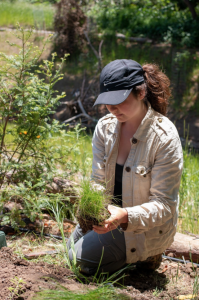
Part of my job in California involved consulting with local experts to design a native pollinator garden. Pictured here is Planting Day, when our little community came together to make that pollinator garden a reality!
What are you studying?
My most recent project served as my capstone for a Master’s of Agriculture in UAlberta’s Department of Resource Economics and Environmental Sociology. For my project, I scoured through existing literature such as government reports, research articles, and community and industry websites looking for different ways in which local Indigenous communities might influence reclamation. These included past and existing programs for participation as well as recommendations for potential future opportunities. I found that community members might be hired directly by oil sands companies and could work on reclamation that way. Consultation (and theoretically accommodation) is a major avenue for Indigenous influence of reclamation. Environmental and social impact assessments represent key opportunities, and more abstract concepts such as public expectation are also important. In addition to identifying pathways for local Indigenous communities to influence reclamation, my sources often proposed key resources needed to make improvements in the future. It’s my hope that by making lists of pathways and required resources, I can support future projects in strategically planning for community leadership and more successful reclamation.
What have been your most exciting or interesting results so far?
Unfortunately, my results show a lack of Indigenous ownership of the reclamation process, despite communities’ explicit calls for more meaningful involvement. I learned that not all means of engaging community members are culturally appropriate. The language used to describe community input to reclamation is often very extractive, misappropriating local knowledge and assimilating it into dominant reclamation procedures. However, initiatives to involve community voices in reclamation seem increasingly common; there were next to no results for Indigenous-influenced reclamation by the 1970s but nowadays some form of participation seems quite common. Furthermore, language is changing to reflect a more inclusive mindset. With a push in the right direction, I think oil sands reclamation could set a precedent for natural resource management and reconciliation on a much larger scale, but that will require sharing decision-making power with local experts.
Why do you do this work?
I loved taking part in this research for so many reasons. First and foremost, it meant I got to spend months reading and writing about oil sands reclamation! I also enjoyed the interdisciplinary nature as I got to combine knowledge of the entire reclamation process with an understanding of sociological challenges experienced by Indigenous communities. The project indicated so many possibilities for future initiatives that it made me starry eyed looking forward to future work.
This and future projects could have important implications for local communities and reconciliation. Albertans not only have a legal obligation to consult and accommodate community concerns, but we also have a moral obligation. The local Indigenous communities in the oil sands region have had close connections with the land there since time immemorial, and they will for time unending. The outcomes of reclamation thus impact these peoples directly and at a very deep level, so it’s only logical that they should have some say in reclamation initiatives in a way that resonates with each unique culture.
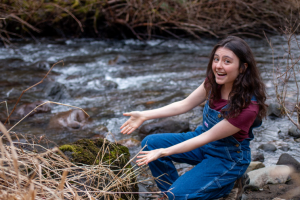
A moss covered rock in a tributary of the Nisqually River on the traditional territory of the Nisqually, Coast Salish, Puyallup, Chehalis, and Cowlitz peoples, or dominantly-known Ashford, Washington State.
What’s been your biggest challenge?
There have been a number of barriers to Indigenous power over oil sands reclamation in the past. A big challenge for me personally has been hearing the disheartened stories of incredibly sharp and brilliant people, stories of burnout and frustration. These same people have been so inspiring; I hope they know how much they’ve accomplished and how much their stories mean to me. My goal is to get to know the hard work they’ve already done and to build on this. Working in this field is going to take perseverance, but I really do have hope for the future.
Have you always wanted to work in land reclamation or the environmental field?
It’s hard to pinpoint an exact moment when ecological reclamation became my field of interest; it’s just always been such a natural fit. My mom tells me stories of my earliest days in Fort Worth, Texas of just staring up at broad green leaves from the curb. Playing in sand, mud, and every soil in between was my favourite pastime, and I considered the trees in our yard to be my closest friends. For this reason, I decided that helping those trees — the beings I really cared about — was the most worthwhile thing I could do with my life. That’s how I found restoration and reclamation ecology!
Possibly the biggest factor in shaping my current research interests occurred during a study abroad in Sweden. The summer study abroad course focused on the environmental and social impacts of climate change and was comprised of half American and half Swedish students. It was my first exposure to present-day Indigenous socio-environmental issues; to my surprise, it was also the first time many of my new Swedish colleagues were hearing about the history of Sámi peoples in Sweden. Touring mine sites and listening to reclamation plans laid the groundwork for my shift from the purely physical sciences realm of reclamation to a more holistic view that includes the social and political sciences. Local artwork criticizing reclamation approaches gave me confidence in my new perspective.
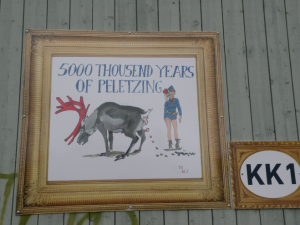
Local art critique of local mine reclamation plans, as “all natural seed pellets” are excreted from a caribou whose future habitat relies on the genuine efficacy of seed pellets.
A final field trip below a dam site really made the lightbulb go off that reclamation ecology was not a totally benign field of study. The dam we visited contributed renewable energy to Sweden’s grid — sounds pretty great, right? The professors explained to us that the newly-formed reservoirs upstream of the dams impeded caribou migrations. We then visited what were formerly the Rabbit Run Falls downstream of one dam where, in lieu of pounding or cascading falls, there was nothing but bare orange boulders. We could tell the boulders had been polished by many years of flowing water, but now they are dry as bone. The shocking visuals drove home the lesson that “good things” like clean energy or reclamation leave lots of room for corruption and/or improvement. It was here that I realized pursuing reclamation ecology merely in terms of the physical sciences was not what I wanted to contribute to, and the lessons learned here ultimately drove my decision to pursue the social sciences during my master’s degree.
What is your favourite part of your work?
So far — and I am quite new to this work — my favourite part has been the people I’ve met both in person and virtually. Their stories have been uplifting, stressful, and inspiring simultaneously. Ecological reclamation often takes the form of hard manual labour, which is a great place to bond with people! Some of my most meaningful friendships developed over a chainsaw and some willow stakes, and I look forward to meeting old and new friends out in the field.
What comes next?
Related to my most recent project, co-management is one way in which local communities have successfully pursued more ownership of natural resource management. My longer-term dream is to pursue co-management in a reclamation context within the oil sands region. As a guest in Canada, co-management regimes seem like a great way to support issues I care about — issues like Indigenous sovereignty — while getting to apply my more physical sciences expertise.
For now, I’m currently exploring luscious Washington State with my partner and bird, and am excited to wrap up the adventure of graduate school and begin working with an Albertan environmental consultant this summer! I can’t wait to get on the ground in northern Alberta. I have a feeling the lessons I learn here will greatly alter my future work and study plans!
Anything else you would like to share?
Ecological reclamation comes in many shapes and colours. It can happen on a small patch of dirt in your backyard or on a landscape scale. In my experience, reclamation organizations are incredibly welcoming of people who want to learn more or contribute to the good work that’s already going on. I’d highly encourage people to reach out to local organizations if ecological reclamation is something of interest. Many organizations rely on volunteers and love to share their passion for reclamation. It’s a great way to make some friends and get your hands dirty!
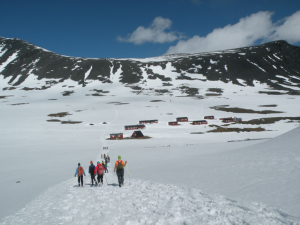
Part of the study abroad in Sweden took place here at Tarfala Research Station where we snowshoed to collect data on climate change impacts to glaciers.

